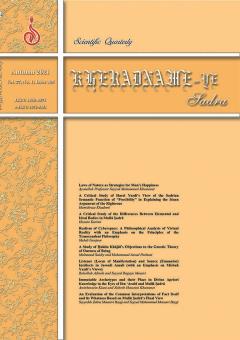-
-
List of Articles
-
Open Access Article
1 - Editor's Note
S. Mohammad Khamenei -
Open Access Article
2 - Laws of Nature as Strategies for Man’s Happiness
S. Mohammad Khamenei -
Open Access Article
3 - A Critical Study of Haeri Yazdi’s View of the Sadrian Semantic Function of “Possibility” in Explaining the Sinan Argument of the Righteous
Hamidreza Khademi -
Open Access Article
4 - A Critical Study of the Differences Between Elemental and Ideal Bodies in Mullā Ṣadrā
Hosain Karimi -
Open Access Article
5 - Realism of Cyberspace: A Philosophical Analysis of Virtual Reality with an Emphasis on the Principles of the Transcendent Philosophy
Mahdi Ganjvar -
Open Access Article
6 - A Study of Ḥakīm Khājūī’s Objections to the Gnostic Theory of Oneness of Being
Mahmud Seydi Mohammad Javad Pashaei -
Open Access Article
7 - Listener (Locus of Manifestation) and Source (Emanator) Intellects in Jawadi Amuli (with an Emphasis on Misbah Yazdi’s Views)
Rohollah Adineh Roghayeh Mosavi -
Open Access Article
8 - Immutable Archetypes and their Place in Divine Apriori Knowledge in the Eyes of Ibn ‘Arabī and Mullā Ṣadrā
Amirhossein Kiani Zohreh Hosaini Khamenei -
Open Access Article
9 - An Evaluation of the Common Interpretations of Fact Itself and its Whatness Based on Mullā Ṣadrā’s Final View
Seyedeh Zahra Mousavi Baygi Seyd Mohammad Musavi
-
The rights to this website are owned by the Raimag Press Management System.
Copyright © 2017-2026







